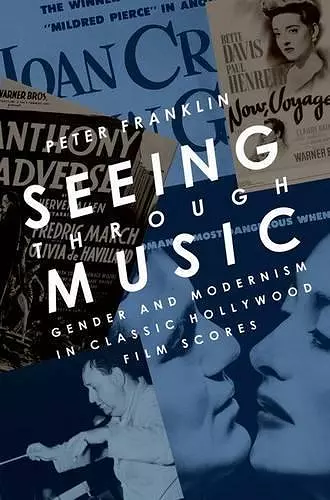Seeing Through Music
Gender and Modernism in Classic Hollywood Film Scores
Format:Paperback
Publisher:Oxford University Press Inc
Published:23rd Jul '15
Currently unavailable, and unfortunately no date known when it will be back
This paperback is available in another edition too:
- Hardback£59.00(9780195383454)

Hollywood film music is often mocked as a disreputably "applied" branch of the art of composition that lacks both the seriousness and the quality of the classical or late-romantic concert and operatic music from which it derives. Its composers in the 1930s and '40s were themselves often scornful of it and aspired to produce more 'serious' works that would enhance their artistic reputation. In fact the criticism of film music as slavishly descriptive or manipulatively over-emotional has a history that is older than film - it had even been directed at the relatively popular operatic and concert music written by some of the émigré Hollywood composers themselves before they had left Europe. There, as subsequently in America, such criticism was promoted by the developing project of Modernism, whose often high-minded opposition to mass culture used polarizing language that drew, intentionally or not, upon that of gender difference. Regressive, late-romantic music, the old argument ran, was -- as women were believed to be -- emotional, irrational, and lacking in logic. This book seeks to level the critical playing field between film music and "serious music," reflecting upon gender-related ideas about music and modernism as much as about film. Peter Franklin broaches the possibility of a history of twentieth-century music that would include, rather than marginalize, film music -- and, indeed, the scores of a number of the major Hollywood movies discussed here, like The Bride of Frankenstein, King Kong, Rebecca, Gone With The Wind, Citizen Kane and Psycho. In doing so, he brings more detailed music-historical knowledge to bear upon cinema music, often discussed as a unique and special product of film, and also offers conclusions about the problematic aspects of musical modernism and some arguably liberating aspects of "late-romanticism."
Franklin examines the gendered tenets of Modernism that relegated film scores - along with Mahler and Rachmaninoff - to the cultural dumpster. He brilliantly dissects 20th-century canon formation and serves up luscious accounts of how music produces its powerful effects in favorite movies. Guilty pleasures exonerated! * Susan McClary, Professor of Music, UCLA *
Seeing Through Music breaks through entrenched clichés and uses symphonic film music to help rewrite the history of modernism and mass culture. Read this book, and trade your guilty pleasure in old movies and their music for guilt-free insight. * Lawrence Kramer, author of Interpreting Music *
Fascinating...highly recommended. * Choice *
An excellent contribution to the scholarly literature on both film music and musical modernism. Its significance lies in the way it links the two, allowing each to shed important light on the reception and aesthetic assumptions of the other. * Notes *
Invaluable for presenting a new perspective on the heavily examined topic of classic Hollywood films...Hopefully the groundwork it lays down will aid future scholars to fill the gaps extant in relation to the study and significance of film music. * Alphaville *
ISBN: 9780190246549
Dimensions: 155mm x 231mm x 15mm
Weight: 299g
208 pages